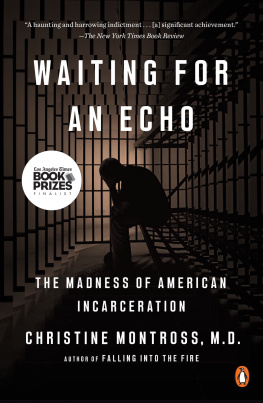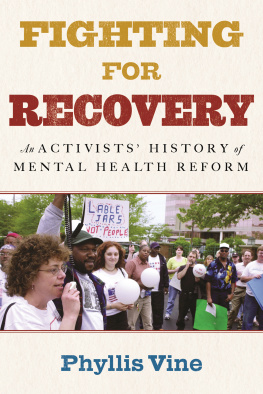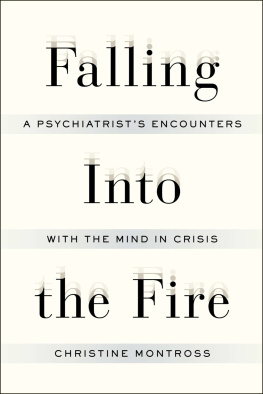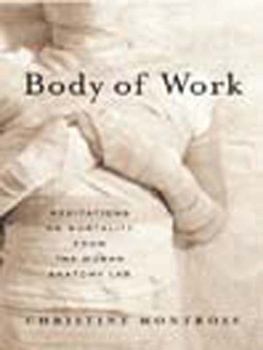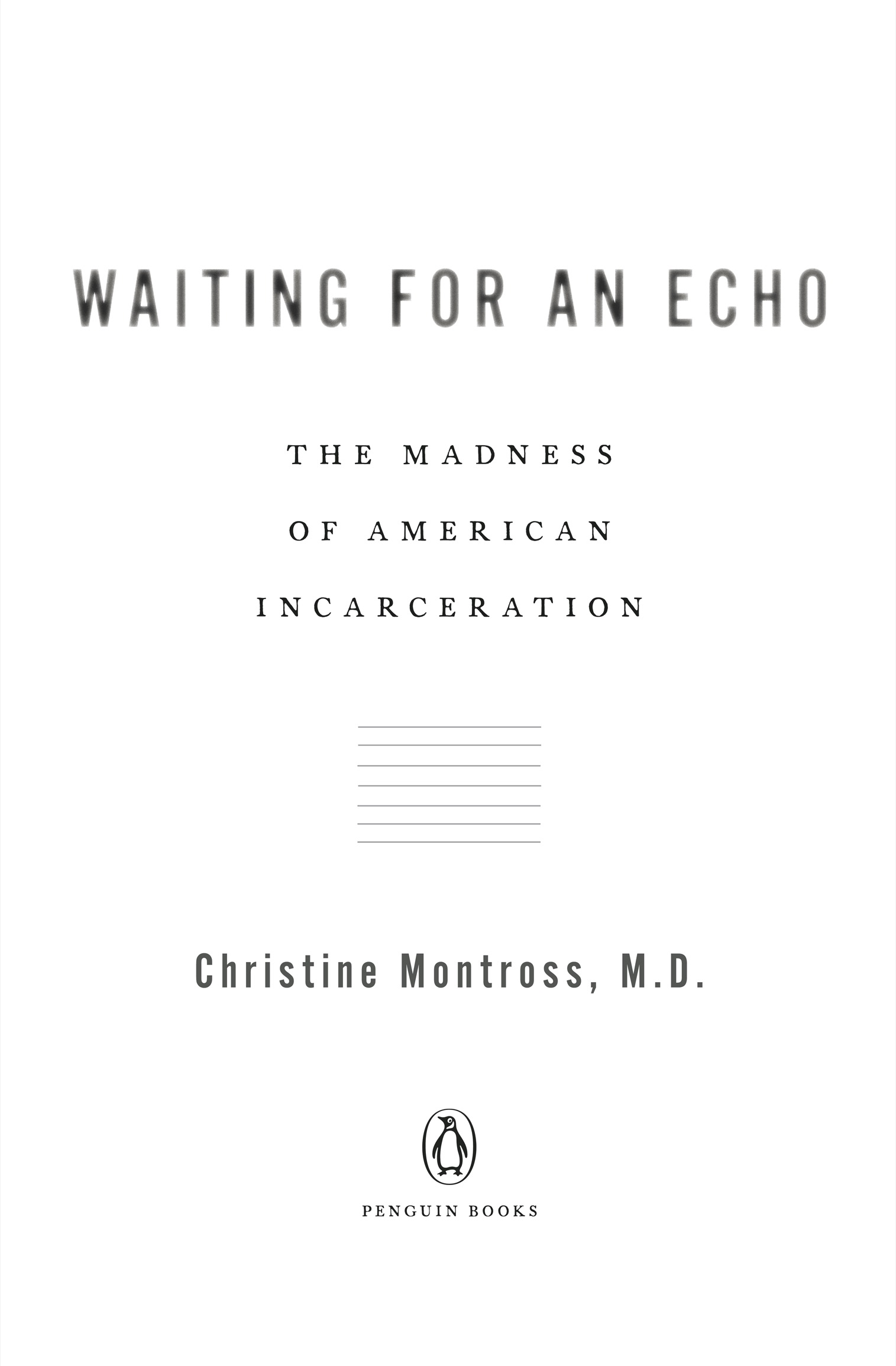ALSO BY CHRISTINE MONTROSS
Body of Work
Falling into the Fire
PENGUIN BOOKS
An imprint of Penguin Random House LLC
penguinrandomhouse.com
First published in the United States of America by Penguin Press, an imprint of Penguin Random House LLC, 2020
Published in Penguin Books 2021
Copyright 2020 by Christine Montross
Penguin supports copyright. Copyright fuels creativity, encourages diverse voices, promotes free speech, and creates a vibrant culture. Thank you for buying an authorized edition of this book and for complying with copyright laws by not reproducing, scanning, or distributing any part of it in any form without permission. You are supporting writers and allowing Penguin to continue to publish books for every reader.
Epigraph from Black Boy by Richard Wright. Copyright, 1937, 1942, 1944, 1945 by Richard Wright; renewed 1973 by Ellen Wright. Used by permission of HarperCollins Publishers.
Some material from this book first appeared in Hard Time or Hospital Treatment? Mental Illness and the Criminal Justice System by Christine Montross, New EnglandJournal of Medicine, October 2016 Massachusetts Medical Society.
ISBN 9780143110668 (paperback)
the library of congress has cataloged the hardcover edition as follows:
Names: Montross, Christine, author.
Title: Waiting for an echo : the madness of American incarceration / Christine Montross, M.D.
Description: New York : Penguin Press, 2020. | Includes bibliographical references and index.
Identifiers: LCCN 2020004470 (print) | LCCN 2020004471 (ebook) | ISBN 9781594205972 (hardcover) | ISBN 9780698152762 (ebook)
Subjects: LCSH: Prison psychologyUnited States. | ImprisonmentUnited StatesPsychological aspects. | Mentally illEffect of imprisonment onUnited States.
Classification: LCC HV6089 .M66 2020 (print) | LCC HV6089 (ebook) | DDC 365/.608740973dc23
LC record available at https://lccn.loc.gov/2020004470
LC ebook record available at https://lccn.loc.gov/2020004471
Cover design: Stephanie Ross
Cover image: Louoates / iStock / Getty Images Plus
Names and identifying details of patients and incarcerated individuals have been changed to protect their privacy.
While the author has made every effort to provide accurate telephone numbers, internet addresses, and other contact information at the time of publication, neither the publisher nor the author assumes any responsibility for errors or for changes that occur after publication. Further, the publisher does not have any control over and does not assume any responsibility for author or third-party websites or their content.
pid_prh_5.5.0_c0_r1
For the 2.2 million adults and children incarcerated in America, with hope.
And for Deborah and my children, with love.
I would hurl words into this darkness and wait for an echo, and if an echo sounded, no matter how faintly, I would send other words to tell, to march, to fight, to create a sense of the hunger for life that gnaws in us all. RICHARD WRIGHT
CONTENTS
A NOTE ON NAMES
All patients and detainees in this book are real people. Their names are pseudonyms and identifying details have been changed to protect their privacy.
In my practice and in this book, I refer to my patients by their first names. I also address the incarcerated men and women I evaluate by their first names if they give me permission to do so.
The custom in most prisons is to refer to detainees by their last names. When writing about incarcerated men and women who are referred to in this way by others, I have preserved this approach in the text to accurately reflect that custom.
INTRODUCTION
Sonia and I are sitting in the lactation room of the prison where she is incarcerated. Neither of us needs the room for its designated purpose, but its a room with a door. So it is one of the only places where I can conduct an evaluation without her answers being overheard by guards or other inmates. I arrange my papers, click open my pen, and ready myself to ask the questions that will help me determine whether Sonia has psychiatric symptoms severe enough to interfere with her ability to understand her charges and how the legal system works, or to prevent her from working constructively with her attorney to assist in her own defense.
Sonia is fifty years old. Her black hair is streaked with gray and pulled back into a tidy bun. She is neatly dressed in this prisons standard attireloose denim pants with an elastic waistband, a maroon T-shirt, an oversize gray crewneck sweatshirt, and white slip-on canvas shoes. On my way to this room, I passed women ranging in age from their early twenties to their seventies, each wearing this same combination. All the clothes are identical, and none of them look new.
I open my mouth to begin the evaluation, but when I do, Sonia closes her eyes and inhales deeply through her nose. She opens her eyes, looks at me, and smiles politely. Then she inhales deeply again. And then a third time.
Sorry, Doctor, she says sheepishly. You smell like shampoo or something. It smells like heaven. I wonder where shes headed with thisis it a symptom or a provocation?and then she apologizes again and looks a little embarrassed. I hope I didnt make you uncomfortable. Its just that this is the first time Ive smelled something good in seven months.
The lactation room is attached to the prisons visiting area, which looks like a combination of a high school cafeteria, with its long tables set up in parallel rows, and a day-care center. Seventy percent of Americas incarcerated women are mothers of minor children, and the ratio in this facility is on par with that number. I come to this particular prison once or twice a month, and nearly every time there are children in the visiting room or waiting in the lobby for permission to enter. This morning a woman with a state Department of Children and Families badge waited behind me to pass through the metal detector, cradling a tiny infant.
How old? I asked her as I dropped my pen and wristwatch into a container and slid off my shoes.
Two and a half weeks, she responded. Moms inside.
Adjacent to the rows of tables in the visiting room, a bright green area rug printed with cartoon figures and the letters of the alphabet covers part of the floor. Ant... Boat... Frog. Octopus... Penguin... Zebra. A dilapidated toy kitchen leans against one of the walls. Shelves stocked with worn picture books stand next to a wooden changing tablebooks that I read to my own children as they sat in my lap when they were young. Owl Moon, Olivia, and Amelia Bedelia.
This morning a woman in the denim pants and maroon shirt was sitting cross-legged on the alphabet rug. She held a nine-month-old boy in her lap and leaned intently toward anotherher twins. Id seen these babies visiting their mother here since they were three months old, and now, in jeans and little fleece jackets, they crawled and cooed at her. She laughed and clapped with them as she blinked back tears.
I HAD NEVER BEEN in jail before I became a doctor. I had an academic understanding of the many systemic challenges that face incarcerated people, but I could not have pictured this room or imagined this scenario. I had no real sense of what correctional facilities were truly like.

